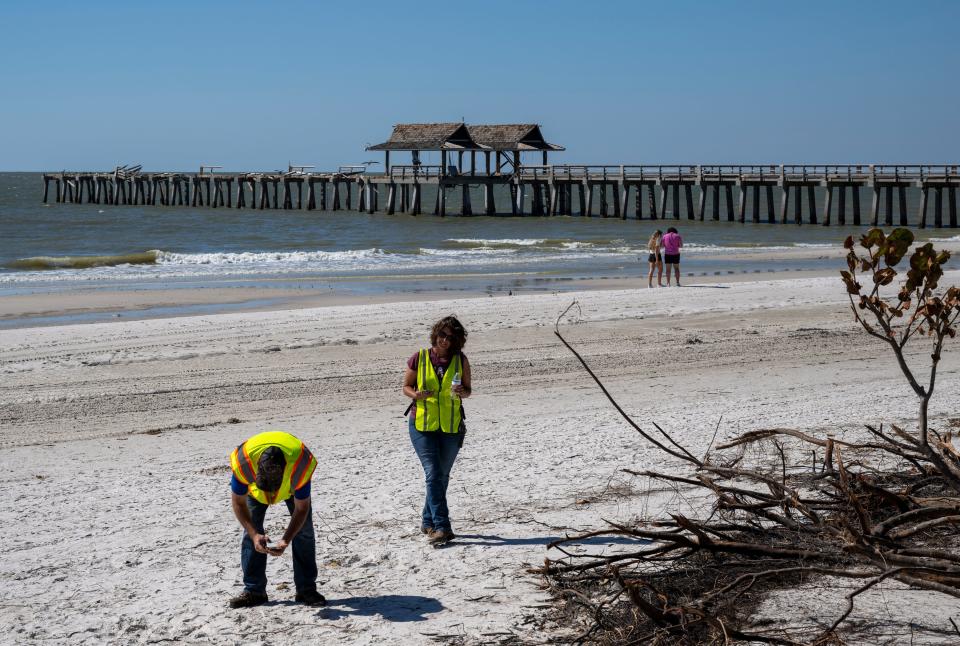Is the Gulf of Mexico safe for swimming? Dangers still lurk below: What to know
How safe is it go in the Gulf of Mexico now?
That depends in part on your own health and your body’s ability to fight potential infection. Or if you have an open skin wound.
Even though it’s been more than four months since Hurricane Ian polluted the Gulf with bacteria and debris, anybody can contract an infection from the water that can be deadly.
More:Michigan family mourns loved one who came to Naples to help, acquires deadly infection
Public health officials and medical professionals advise the risk never goes away because a fleshing-eating bacteria, Vibrio vulnificus, is naturally present in the Gulf, especially when the water temperature goes up.
For people with weakened immune systems, the best course of action is to stay out of the water because they can have a severe complication from Vibrio infection, according to public health officials.
The same holds true for anyone with an open wound that can lead to the infection.
More:Running on empty: Fort Myers Beach faces budget shortfall after Hurricane Ian damage
In some cases, amputation of an infected limb is required and death can occur.
If you are otherwise healthy with no immune system concerns, the best precaution is to always wear shoes of some nature on the beach and in the water.
Ian clean up may be deceptive to tourists
“Visitors may not realize the destruction (from Ian),” according to Dr. Mary Beth Saunders, infectious disease specialist at Lee Health, the publicly-operated hospital system in Lee County.
“There may be broken glass or pieces of metal underneath the sand that places you at risk. How long will this wash out and wash back? We really don’t know,” she said.
More:Red tide again staining Lee County waters, state health department issues advisory
Southwest Florida experienced a dramatic uptick in cases of Vibrio infections after Ian hit Sept. 28, according to the state Department of Health in Lee and Collier counties. The case numbers appear to have declined.
Lee Health ran lab tests for 20 people for Vibrio in the first three days immediately after Ian and has not seen any cases since, Saunders said.
Still she cautions that people may have gone elsewhere, like an urgent care center, for medical attention. Most people recover on their own after a couple of days and don’t seek care.
There were 27 cases of Vibrio in Lee from Sept. 28 when Ian hit to the present, according to the state Department of Health’s reportable disease database.
Hospitals and other medical centers must report Vibrio infection but it takes time for the cases to be confirmed.

In Collier there have been four cases of Vibrio since Ian even though the number is provisional and the database shows one case, according to Kristine Hollingsworth, spokeswoman for the public health department in Collier.
The case count does not include a Michigan man who came to Naples last October who fell in the water while helping a friend with his boat, scratched his leg and soon afterwards died. His case is included in Michigan as his place of residency, she said.
So where’s the risk?
What the public needs to understand, especially visitors, is that no government entity or private organization tests the Gulf waters for the bacteria that causes Vibrio.
The state health department’s Healthy Beaches program only tests for bacteria that is related to presence of fecal matter in the water.
“Vibrio bacteria is naturally occurring in warm salt water and brackish waters and (is) not part of the testing for the Healthy Beaches program,” Hollingsworth said.

Dr. Shawn Patterson, an emergency room physician with the NCH Healthcare System in Collier, said in an email that he and his colleagues assume there is “always a risk to the immunocompromised or those with deeper cuts” of getting infected with the Vibrio bacteria.
There also is the risk of coliform bacteria, stool bacteria. after heavy rain or areas on the beach that may be receiving more runoff, he said.
“These cause the same vomiting and diarrheal illnesses that they would if they contaminated your food,” he said. “Swallowing too much water contaminated with coliform bacteria can cause gastrointestinal illness.”
Debris from Ian still populates the beach and water, and often is hidden under sand or cannot be easily seen in the water, he said.
He suggests beachgoers survey the beach and water for 100 square yards before deciding where to set up their beach towels and chairs.
Saunders, at Lee Health, said the emergency rooms are not going so far as to tell people to stay out of the Gulf but people who are immunocompromised need to avoid warm water where the bacteria is more likely to be present.
The same holds true for canal water that may not flush out lingering bacteria and brackish water compared to directly on the beach, she said.
Saunders suggests anybody with diabetic neuropathy should check their feet after walking the beach to make sure they didn’t get a cut.
Here are some common questions and answers to beach safety
What are the symptoms to watch out for?
Redness and pain at the site of a cut soon after swimming in the Gulf. Nausea, vomiting, diarrhea in the case of coliforms. Respiratory irritation from decomposing fish, red tide, algae blooms.
At what point of infection/symptoms should people seek medical care?
Any redness associated with a wound, seek care immediately. Most bacterial intestinal infections are self limited. However, if vomiting and diarrhea is resulting in dehydration or severe abdominal pain, it is recommended to visit the emergency room.
Who should stay out of the water?
The immunocompromised, those with cuts (not scrapes or scratches), those that aren't strong swimmers.
This article originally appeared on Naples Daily News: Bacteria that causes flesh-eating disease lives naturally in the Gulf

